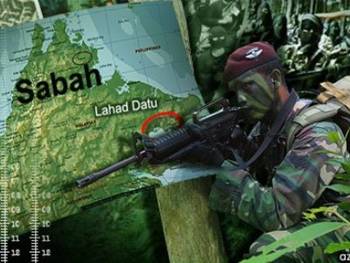When the Fog of War lifts on Lahad Datu Standoff!

There’s a huge security vacuum in Sabah.
The reasons for Lahad Datu, given the fog of war, may keep changing during the course of such a conflict.
The first casualty in a war is the truth.
For starters, they dillydallied for three weeks in an act of extreme weakness if not desperation and to play politics with the issue because security in Sabah until recent days was under the Prime Minister’s Department — so more illegal immigrants can come in and enter the Electoral Rolls — and not under the Police or Armed Forces.
Who trained the Moro National Liberation Front (MNLF) and gave them safe havens inSabah? MNLF leader Nur Misuari’s recent statement on these issues must be taken seriously as he, more than Putrajaya, gets the benefit of the doubt in a balance of probabilities.
By the same token, we don’t know whether the Sulu terrorists admitted to carrying out beheadings and other mutilations in Sabah during the on-going Lahad Datu Standoff. The Suluks have more to lose for such dastardly acts, if true. It would be a Public Relations disaster of the highest magnitude; play into Putrajaya’s already bloodied hands, and turned the local population against them.
Malaysia will have no stomach for such a war after being allegedly engaged, overtly and covertly, in the long-simmering conflict in the southern Philippines.
The “heirs” know that possession is nine-tenths of the law when it comes to the negotiating table for a diplomatic and political solution. Even so, the Suluks in Sabah or from Sulu would have to unconditionally surrender any territory seized when the country (Sabah) regains its independence.
The Cobbold Commission in 1962 was not a Referendum but a sampling of community leaders. Ironically, only the Suluk and Bajau communities polled agreed to Malaysia. The others, including the Orang Asal, were against the idea of Malaysia in Borneo to facilitate on demographic grounds the merger between Chinese majority Singapore and non-Malay majority Malaya.
Brunei stayed out of Malaysia at the 11th hour largely because of a rebellion in the sultanate against the idea of Malaysia.
The defunct Sulu Sultanate, of course, does not have a leg to stand on in Sabah or parts of it.
The defunct Sulu Sultanate’s so-called transfer of sovereignty over Sabah not so long ago to the Philippines Government by Power of Attorney — now expired — is a nullity from the very beginning in international law.
The sovereignty of Sabah rests with its people.
The Sulu Sultanate died out, recorded the Madrid Protocols of 1877 and 1885, when its last Sultan died without leaving a male heir. Spain which was ruling the Philippines gave up all or any territorial claims in North Borneo under the Protocols with the United Kingdom and Germany. Read:
The Suluks in Sabah, claiming marginalisation and disenfranchisement since 1963, given the continuing influx of Bugis illegal immigrants in particular and Usno being deregistered to make way for Umno, is another matter altogether. This cannot be related to the so-called Sabah claim.
Read:
http://www.malaysia-today.net/mtcolumns/special-reports/54937-sabah-and-the-sulu-claims
http://www.bt.com.bn/golden-legacy/2013/03/07/sabah-and-sulu-claims
The entire land area of Sabah belongs to or potentially belongs to the Orang Asal under Adat as Native Customary Right (NCR).
Adat and the Orang Asal came long before the Sulu Sultanate’s “Agreement” with the British North Borneo Chartered Company which obtained a Crown Charter from the Queen of England to rule Sabah on her behalf.
Sabah was never conquered in a battle or war by any party except by the Japanese during World War II, and this too was an unprovoked war in Sabah and therefore amounted to war crimes, genocide and crimes against humanity.
The Japanese in Sabah were “defeated” by the British and subsequently surrendered.
So, by a legitimate Act of Surrender, War and Conquest, Sabah became British Territoryuntil it was returned to the Orang Asal and other Sabahans on 31 Aug, 1963 by self-determination. Even so, the Colonial Office in London agreed to purchase Sabah from the British North Borneo Chartered Company for 1.2 million pounds sterling.
Sarawak became independent on 22 July, 1963 after a brief period of British colonial rule after World War 11 during which the Japanese occupied the country. Sarawak was an independent country under a Rajah for over 150 years before the Japanese marched in.
He challenged Malaysia to appear before the International Court of Justice (ICJ) and prove its case on Sabah and Sarawak.
He said peace would only come to the southern Philippines when Malaysia is removed from the equation. He expects MNLF-Manila peace talks to resume sometime this month in Jakarta.
The chickens are coming home to roost
It should also rule that the parti parti Malaya have no business being in Sabah andSarawak. This is a violation of the 1963 Malaysia Agreement, one of the many constitutional documents making up the unwritten Constitution of Malaysia. It would become clear once the fog of war lifts that the presence of such parties in Sabah is among the reasons, albeit indirectly, for the Lahad Datu Standoff.
The chickens are also coming home to roost after the Election Commission, on the directive of a self-serving Putrajaya, naively divided the Electoral Rolls in Sabah as composed of Muslim Bumiputera, non-Muslim Bumiputera, Chinese and others.
The so-called Muslim Bumiputera on the Electoral Rolls is packed with illegal immigrants at the expense of local Muslims.
The non-Muslim Bumiputera category tries to drive a wedge between the majority Christian Orang Asal and minority Muslim Orang Asal when they are related to each other.
http://malaysia-today.net/mtcolumns/guest-columnists/55144-sabah-security-in-fits-and-starts
http://malaysia-today.net/mtcolumns/guest-columnists/55148-jeffrey-wants-orang-asal-allies-as-force-to-be-reckoned-with-in-mainstream-politics

